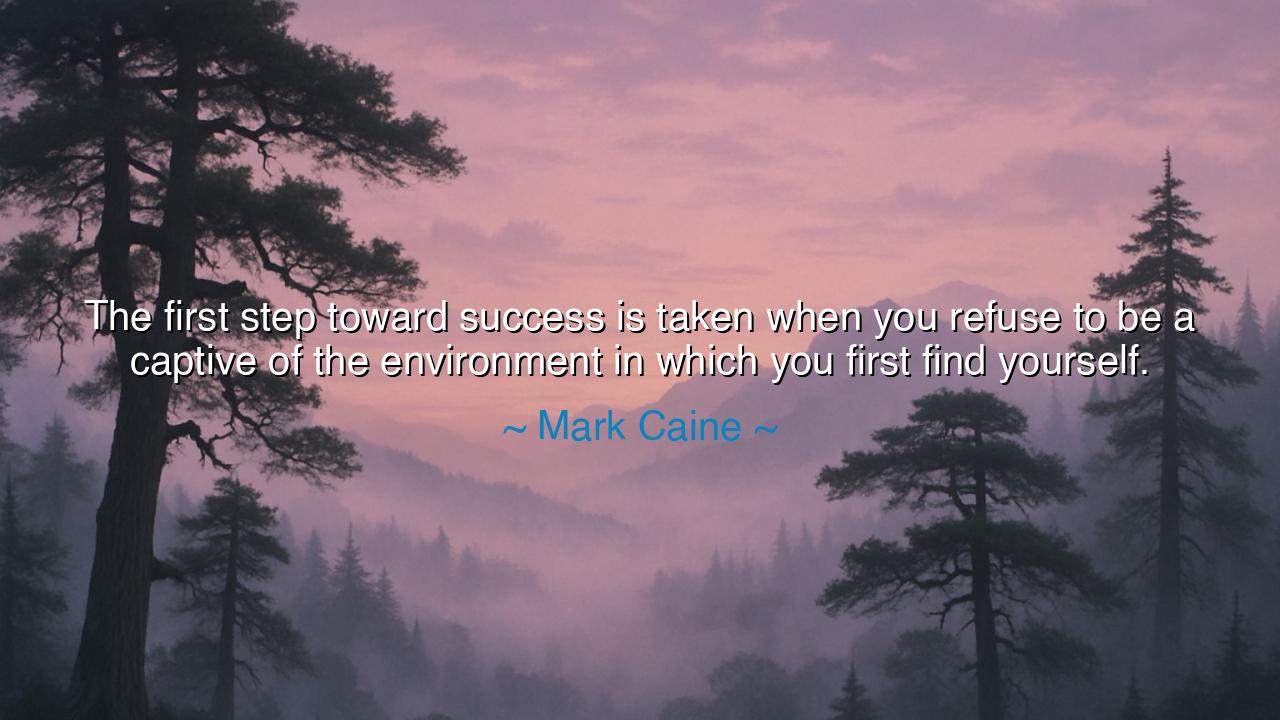
The first step toward success is taken when you refuse to be a
The first step toward success is taken when you refuse to be a captive of the environment in which you first find yourself.






Hear, O child of destiny, the solemn yet liberating words of Mark Caine: “The first step toward success is taken when you refuse to be a captive of the environment in which you first find yourself.” This teaching strikes at the chains that bind so many souls. For every man and woman is born into circumstances not of their choosing—poverty or wealth, ignorance or knowledge, oppression or freedom. Yet greatness is not determined by beginnings but by the refusal to let beginnings define the end.
To refuse to be a captive is to awaken to the truth that your environment may shape you, but it need not imprison you. Many accept the walls around them as eternal, bowing before the weight of circumstance. But the spirit that seeks success looks upon those walls not as barriers but as challenges, not as destiny but as obstacles to be broken. The first step, Caine teaches, is not outward but inward: a decision of the soul to rise, no matter where one begins.
Consider the life of Frederick Douglass, born into the chains of slavery. His environment declared him a slave for life, denied him learning, and sought to crush his spirit. Yet Douglass refused captivity of the environment. He taught himself to read, escaped his bondage, and became one of the greatest voices for freedom and human dignity in history. His triumph did not come because he was given freedom but because he refused to accept his environment as his fate.
So too with Abraham Lincoln, born in a log cabin, poor and uneducated. His environment promised obscurity, yet he refused to be bound by it. By labor and relentless self-education, he rose from frontier poverty to the highest office of his nation. His story shows that the environment of birth is no master to the soul that hungers for greatness. Success begins when captivity ends—and captivity ends when the spirit says, “No more.”
The wisdom of this quote is both heroic and practical. To break free from captivity does not mean denying one’s roots, but refusing to let them dictate the limits of one’s life. The world remembers not those who accepted their chains, but those who shattered them. Every inventor who challenged tradition, every reformer who stood against the tide, every dreamer who dared to walk beyond their village—all refused to be captives of environment, and thus opened paths for others.
O listener, take this counsel deeply: examine your own environment. What habits, what fears, what voices hold you captive? Is it poverty, telling you that you cannot rise? Is it tradition, saying that your dreams are foolish? Is it the judgment of others, chaining you to mediocrity? Identify the walls, and then take the first step by refusing to bow to them. That refusal, quiet though it may seem, is the dawn of victory.
Therefore, let this be your charge: refuse captivity, claim freedom. Do not let where you were born decide where you will die. Build new paths, seek new knowledge, strive for greater heights. In doing so, you not only free yourself—you become a light to others still captive in their own environments, showing them that destiny is not inherited but chosen.
Thus the wisdom of Mark Caine endures: “The first step toward success is taken when you refuse to be a captive of the environment in which you first find yourself.” The step may be small, but it is the step that changes everything—the moment when the soul ceases to be bound and begins to walk the road of its true becoming.






AAdministratorAdministrator
Welcome, honored guests. Please leave a comment, we will respond soon